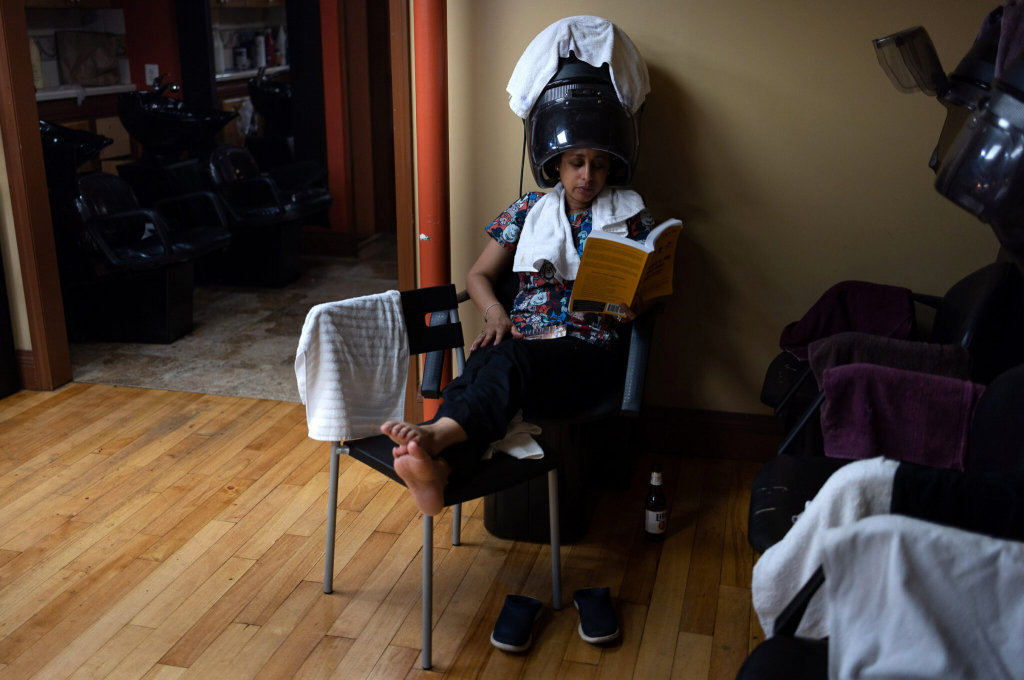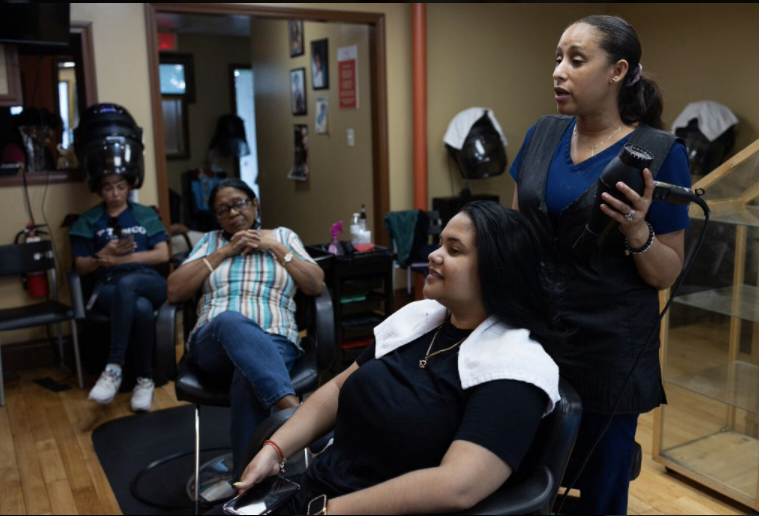On a bustling Friday morning, the aroma of rice and beans wafts through a cloud of hairspray in Romy’s Beauty Salon in Meriden. Merengue music soothes the senses. Customers exchange pleasantries in Spanish as Romy Norwood offers each a small bowl of “arroz y habichuela,” the Dominican staple of rice and beans. Later in the day, Norwood repeats the courtesy with small mugs of strong coffee, “cafecito,” prepared by her mother, Yolanda Sosa, in the kitchenette in the rear of the shop. Unlike Norwood and her mother, most clients aren’t wearing a mask.
Neither Norwood nor anyone in her immediate family has been infected with COVID-19. Norwood, 46, and her husband, Jeffrey Norwood, 65, live in Cheshire with their children Jennifer, 14, and Ramon, 12, and their dog, Zeus. Since the start of the pandemic, Norwood says, they have been vigilant about wearing masks, social distancing and getting tested and vaccinated. Two beloved aunts succumbed to COVID in the Dominican Republic, where Norwood grew up, but everyone else in her family has remained healthy, including 73-year-old Sosa, who splits time between Norwood’s Cheshire home and her own home in the Dominican Republic.
By all accounts, Norwood and her loved ones appear to have dodged the most severe health outcomes of COVID. This is especially good news for the Norwoods since Black and Hispanic families have been disproportionately impacted by the virus in health outcomes and as small-business owners. According to a report by the U.S. Small Business Association, the total number of people who were self-employed and working declined by 20.2% between April 2019 and April 2020. Hispanic people experienced a more significant decline, at 26%. The biggest declines were experienced among Asian and Black people, with 37.1% for Asians and 37.6% for Blacks.
Norwood’s beauty salon was shuttered for almost six months during the pandemic. “I didn’t have an emergency plan,” Norwood says in Spanish. Some clients died of COVID, and others simply have not returned to her salon. She decided to forgo a federal PPP loan and incurred credit card debt. She estimates her business has returned to 75% of its pre-pandemic performance.
“One way or another, COVID will get you,” Norwood says about the mental fatigue her family has experienced. She says hypervigilance, anxiety and fear have crept in, replacing many of the happy feelings they had when they settled in Connecticut. The disease has taken an emotional toll on the family. They have been uninfected yet greatly affected by COVID.
Seeking Refuge From COVID
While taking a leisurely Sunday drive through Meriden in 2006, Norwood was attracted to the city’s quiet beauty and spirit. There were Black and brown people like her and Jeffrey. Spanish was spoken in bodegas. At the time, the couple was living and working in West Haven after having met in The Bronx. Norwood also liked that Meriden was far enough away from West Haven that she would not work in direct competition with her former beauty salon employer. So, she and Jeffrey, a physician at the West Haven VA Medical Center, moved to Meriden, and she opened Romy’s Beauty Salon on West Main Street. They lived in the upstairs apartment. In 2007, they were married in Jamao al Norte, Norwood’s hometown in the fertile Cibao region of the Dominican Republic.

Sosa splits time between Connecticut and her home in the Dominican Republic.
In Meriden, Norwood established a loyal clientele, and the couple started their family. Business was good. They became parishioners at Saint Rose of Lima Catholic Church, where today Norwood serves as a eucharistic minister and a leader on the parish council. As Jennifer and Ramon grew up, the family began to vacation two or three times a year—the Bahamas, Mexico, Italy, Punta Cana. They went on cruises.
On March 21, 2020, the Norwoods flew to the Turks and Caicos Islands to seek refuge from the global pandemic. Looking over their shoulders on the flight from Bradley International Airport, they realized they were the only passengers on the plane, Norwood says. When they arrived at Providenciales, Norwood recalls, tourists were scrambling to leave the island. The last flight to the United States departed shortly after their arrival. They initially embraced the lockdown in their hotel room, thinking they would weather the hype and fly home to normalcy.
Then all flights were grounded in Turks and Caicos. A curfew was imposed. They were permitted outdoors for one hour a day. Groceries at the local supermarket were rationed. Food quickly became a scarce resource. Leftovers, Norwood says, became the dreaded meal of the day. They were stuck, marooned on a tropical island, and weren’t even allowed to swim.
Then the hotel manager demanded $10,000 a week from Jeffrey Norwood to remain in their room beyond their original reservation. So, they found an online rental, bought linens and rid the house of cockroaches. It was a mess, Norwood says. They hunkered down.
Their only outside contact was Zeus, a scroungy, flea-infested watchdog.
At first, the family didn’t have much to do with the spotted pit bull-dalmatian mix. They kept their distance. “Could he transmit the virus?” Norwood recalls thinking at the time, given the widespread uncertainty about COVID. Zeus was always hungry and thirsty. He scratched at their front door at night. Later they would learn he had been whipped with sticks and left outdoors during hurricanes.
Then one day, Zeus joined the family on a walk during their one hour outdoors. When he was grazed and injured by a passing vehicle and began yelping, recalls Norwood, they decided to allow him into the house to clean him up and help him heal. Thus began the process of adopting Zeus.

The Norwoods spent a month on the island before Jeffrey chartered a private jet from Miami to fly his family home to Connecticut on April 17, 2020. They submitted the paperwork for Zeus. A month later, Jeffrey drove to Miami, picked up Zeus and returned to Cheshire.
“I believe Zeus is an angel,” says Norwood, her eyes sparkling, as she recounts how the Turks and Caicos misadventure represents both the best and worst of their pandemic experiences. “God sent him to care for and protect us,” she says. Today, she says, “Zeus is king of the house. He has three beds, all the food he wants,” adding that he adores her mom.
‘Up To Here With COVID’
COVID has affected the Norwood family in myriad ways.
“We’re without life,” Norwood says in Spanish while taking a break between clients at her salon. No more family movie nights with popcorn, she says. No vacations. No romantic getaways. No games. No fun.
There have been a few weekend trips to New Hampshire, where they rent a house, but they take their food and sequester, Norwood says. The kids don’t want to go back to New Hampshire, she says, because they aren’t allowed to leave the house. “I’m up to here with COVID,” says Norwood. “I don’t want to hear anything else about COVID.”
She says her mom’s help at home and in the salon has been unconditional. After the debacle on Turks and Caicos, Norwood described how she would come home from the salon, strip down in a separate area and shower. Her mom’s Dominican cooking was always waiting for her. “My mother is everything to me,” she says.
Her husband is fearful of getting COVID. Norwood says her husband doesn’t talk about what he has experienced as a physician on the front lines. He still wears two masks and goggles or a shield, whether he’s getting gas or going to a Mets game, Norwood says. In 2018, the couple relocated to Cheshire for its schools. When they returned to school, Jennifer and Ramon had fallen behind. Norwood says Jennifer has become less sociable and more of a homebody. She avoids crowds lest she be exposed to the virus. She has been bullied at school, where classmates have ridiculed her hair and body type. Her children have become anxious, Norwood says.
During the spike in infections last December, Norwood decided to keep Ramon home from school until the end of February, when he turned 12 and was eligible for the adult vaccine. She felt the higher dosage would be more protective and worth the wait. However, school officials hounded Norwood about Ramon’s absence. She suspects online instruction is purposely inferior to persuade parents to return their children to school.
“Tengo temor porque el COVID es impredecible,” Norwood says in Spanish. “I’m fearful because COVID is unpredictable.” It may not affect you at all or it may send you to the hospital, she says. She fears for her children and her elderly mother. With all of her precautions, clients still sneeze while touching their hair, face and shoulders, she says. Many have later called to inform her that they’ve tested positive. Jeffrey prefers that she close the salon and not work, she says.

“I got the works,” says longtime customer Jeannette Solano, 53, of Meriden, about getting her hair washed, colored and beautified by Norwood on a recent Saturday afternoon. For Solano, the salon experience is a reprieve from the daily grind of the pandemic. “Estaba muy triste,” she says in Spanish, “I was very sad” about Norwood salon’s hiatus in 2020. Describing Norwood as friendly, humble and fun to be around, she says she stops in once a month. “Romy does it right,” she says, explaining how a hairdresser recently damaged her hair during a visit home to the Dominican Republic. Solano has received two doses of the Moderna vaccine, she says.
During an afternoon lull at the salon, the air conditioner quits. Norwood sits down and asks Sosa to wash her hair. A few minutes later, Norwood’s back on her feet. At the end of her 10-hour shift, the salon is quiet. Norwood sits beneath a hair dryer, elevates her bare feet and closes her eyes for 20 minutes. “I need this,” she says.
In July, Norwood, her children and her mother plan to vacation for three weeks in her “pueblo Dominicano,” Jamao al Norte. Jeffrey is not going, she says. “I miss my life before COVID. I miss the freedom. The river, the food, the people, the beach,” says Norwood during a break between clients. “I can’t wait.”
Cover Photo: Jennifer Rodriguez, 27, of Meriden, gets a “keratina” – which in Spanish means a straightening – by Romy Norwood. From left under hairdryer is Melissa Hernandez, of Middletown; Romy’s mother Yolanda Sosa; Rodriguez; and Norwood.
All photos by Patrick Raycraft.
Publisher’s Note: ‘One Way or Another, COVID Will Get You:’ Uninfected Yet Greatly Affected was first published on Connecticut Health I-Team.
CTLN and c-hit.org collaborate to best serve the Connecticut Hispanic, Latino community.




